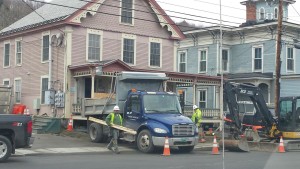First, the bad news:
- The city council in Parsippany, N.J., faced a stark choice –- affordable housing or Whole Foods — and picked the latter. Just how it happened that the fate of a 26-acre site called Waterview came to this is no doubt a story in itself, but this much seems clear: the powers that be leaned against a 600-plus unit affordable housing development, contending it would be a drain on local taxes.
 This might not be in the spirit of affirmatively furthering fair housing. That site, next to a neighborhood of single family homes, might well be a “high-opportunity” location for affordable housing in a city with a median family income of $81,000. Whole Foods, we suspect, does not as a general rule move in to low-opportunity areas.
This might not be in the spirit of affirmatively furthering fair housing. That site, next to a neighborhood of single family homes, might well be a “high-opportunity” location for affordable housing in a city with a median family income of $81,000. Whole Foods, we suspect, does not as a general rule move in to low-opportunity areas. - The Illinois Housing Appeals Board was established six years ago to hear pleadings by developers contending they’ve been unfairly prevented from building affordable housing projects. The appeal process was created in connection with a law requiring municipalities to submit affordable housing plans to the state if less than 10 percent of their housing units were affordable. Well, it seems that municipalities ignore the law with impunity, the board has no authority, and it has yet to hear a single case. Back to the legislative drawing board? In the Chicago metro area, low income tax credits are issued preponderantly in lower-income areas, an analysis found. Among the wealthy suburbs where opponents are showing up in force is Wilmette (pop. 27,000, median household income $130,000), where a hearing on a 20-unit development drew a crowd the other night.
The good news comes in two forms, tangible and intangible.
- On the tangible side, 19 units of affordable housing are back on the rolls in Montpelier, thanks to a rehab project
 by Downstreet Housing and Community Development, with an array of collaborators. These are studios and one-bedrooms on Barre Street, all a short walk to downtown. This is the sort of transit-friendly positioning that we’d like to see more of.
by Downstreet Housing and Community Development, with an array of collaborators. These are studios and one-bedrooms on Barre Street, all a short walk to downtown. This is the sort of transit-friendly positioning that we’d like to see more of. - One of the collaborators was the Vermont Housing & Conservation Board, an affordable-housing mainstay that has been underfunded for years. A report to the governor from the Council on Pathways to Poverty calls on the state not only to fund VHCB at its full statutory rate ($19.5 million), but also to restore the money meant for VHCB that has been diverted to fill budget gaps since 2001 ($41 million). With full funding, VHCB might be able not only to support more low-income housing, but workforce housing for people who make “middling” wages of $13 to $25 an hour. The report also calls for a $2 lodging fee, half of which would be reserved for affordable housing and homelessness-aversion. This is intangible good news, in the sense that somebody is saying and pushing for the right things that have yet to happen.
- Speaking of workforce housing, people in Bend, Oregon, are realizing that middle-class people ineligible for subsidized housing are shut out, as housing prices soar. So the City Council is starting to give some serious thought to what can be done for them in addition to low-income people. Again, nothing has happened yet, but we take the fact that this discussion is underway as more (intangible) good news.
- This item might seem like a stretch for the good news category, but at least it’s of the intangible all-talk variety: A prominent Republican has emerged to say that the housing crisis deserves more attention in the presidential campaign. That’s Scott Brown, the former senator,
 who also happens to be a member of the board of J. Ronald Terwilliger Foundation for Housing America’s Families. In an opinion piece, Brown lamented that housing has been missing from the debates, and said that if he were moderator, he’d ask the candidates what they’d do about the shortage of affordable rentals. Meanwhile, another opinion piece, by foundation president Pamela Patenaude in a housing industry publication, calls for an increase in federal support for the low-income housing tax credit. Hear, hear.
who also happens to be a member of the board of J. Ronald Terwilliger Foundation for Housing America’s Families. In an opinion piece, Brown lamented that housing has been missing from the debates, and said that if he were moderator, he’d ask the candidates what they’d do about the shortage of affordable rentals. Meanwhile, another opinion piece, by foundation president Pamela Patenaude in a housing industry publication, calls for an increase in federal support for the low-income housing tax credit. Hear, hear.